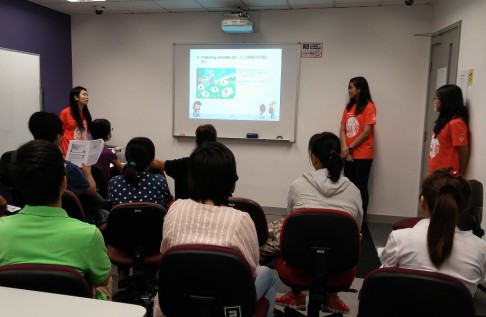Jockey Club “PolyU Serves” creates unique service-learning experience
[Sponsored article] Remarkable progress achieved by the three-year sponsorship programme, with students helping thousands of underprivileged citizens.
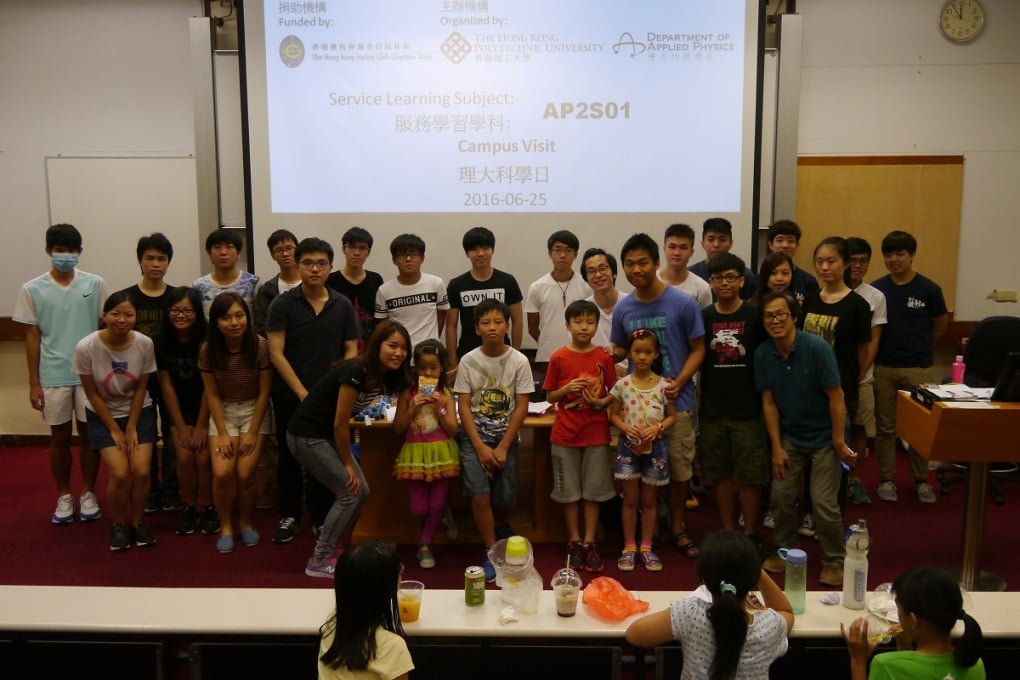
[Sponsored article] In learning one will serve, and in serving one will learn. This principle explains why The Hong Kong Polytechnic University (PolyU) led the way in making “service- learning” a core credit-bearing component of its undergraduate programmes. Introduced in 2012, the aim was to give pragmatic, progressive learning experience while meeting society’s needs.
One current initiative, supported by a HK$3 million donation from the Hong Kong Jockey Club Charities Trust, is offering community services in Yau Tsim Mong and Kowloon City Districts between 2015 and 2017. Nine academic departments are implementing a total of 14 targeted projects coordinated by PolyU’s Office of Service-Learning.
Over the past two years, the Jockey Club "PolyU Serves" Community Service Project has helped to make students more responsible citizens and channelled their energy and ideas in socially useful ways. More than 600 students have taken part, contributing over 20,000 service hours per year and benefiting as many as 2300 people in need. The scheme is also fostering a service culture on campus, which brings positives for students, the university, and the wider community.
After picking a preferred project, PolyU students received various training and guidance at the beginning and were then assigned different roles at NGOs, social service centres and primary schools. They were expected to prepare their own service materials, communicate with clients to identify their genuine needs, and run services just like professionals. PolyU teachers oversaw all these closely and gave timely constructive advice.
Each year, annual sharing session will be held to share service-learning outcomes among all stakeholders with a specific theme to direct attention to different areas of concern. In 2015, it was Health Enhancement, with particular focus on caring for the elderly. In 2016, it was Sciences and Languages, with a view to improving the well-being of disadvantaged children.
Physics is everywhere
Dr Albert S.H. Choy, an instructor at PolyU’s Department of Applied Physics, runs a service-learning project entitled “Enhancing Scientific Literacy through Daily Physics”. Its main aim is to get the younger generation interested in physics and inspire a spirit of exploration. The important thing, Dr Choy believes, is to give children a real taste of science.
“We organise fun-filled workshops, which encourage children to make and play with their own ‘scientific’ toys,” Choy says. “For instance, we use a mock steam vessel made with a blown-up balloon and a CD to prove that airflow can minimise friction. We also explain the concepts of different types of energy and energy conversion with Lego car competitions.”
The project welcomes PolyU students from any discipline who are keen to get involved.
“We put the right people in the right roles,” says Choy, who takes pride in the cross-disciplinary nature of the project and the fact that it broadens the horizons of all participants. Even arts and languages students can prepare course materials, host workshops, and learn something along the way.
“It has been an incredible experience for me,” says Kelvin Tsui, from PolyU’s Department of Applied Biology and Chemical Technology, who took part last year. “I had never taught before, not to mention dealing with children with learning difficulties. Now I know how important it is to treat students in a caring and fair way.”
The opportunity to gain practical experience in a real-world context gave new perspectives and made his own studies more productive but enjoyable. Being an “older brother” for the first time in his life is something he won’t forget.
Such feedback confirms Dr Choy’s belief that “physics is not in a textbook, but everywhere in all of our lives.”
Service-learning is a pedagogy focuses not just on core aspects of critical thinking and academic learning, but also touches on things like interpersonal skills and civic responsibility. In this way, students see how the world works and why service matters.
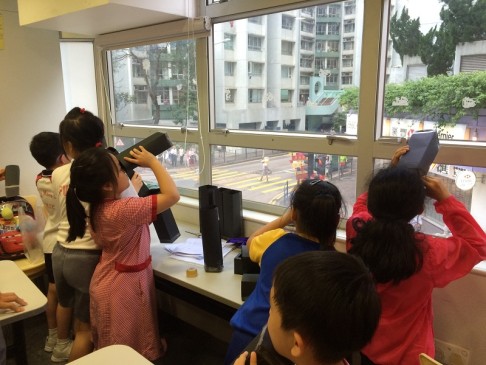
Teaching outside the box
What Kelvin Wong learned from last year’s “Language Arts for Community Project” is that a good teacher inspires hope and instils a love of learning. The student from PolyU’s Department of Applied Physics opted to join this initiative for a very particular reason.
“As a Form Six student, I was diagnosed with dyslexia,” says Wong, who was teaching Chinese. “I’m very eager to share my own experience with children who may have similar problems, helping them to overcome learning barriers.”
Under the guidance of Ms Karen Lau, a lecturer at the Department of Chinese and Bilingual Studies, Wong and other classmates came up with creative ideas to teach children with special needs at schools and social service centres. Lau also emphasised that language learning is not just about reading and writing, but also viewing.
“We made use of audio-visual technologies such as videos, social media and even emojis,” Lau says. “We played the sounds of stream, rain, waterfall to children to explain the way people described them. We led them through storybooks showing pictures of the growth of bananas to understand why there are black dots on the banana skin. We show them pictures of the flower we talk about.”
When teaching his class of new immigrant children, Wong came up with the concept of “little reporters”. He asked the students to produce a three-minute video report on what they saw at school and introducing the school environment to viewers.
“I guided them through the project and helped them tackle every single problem,” he says.
In doing this, Wong realised that a good teacher has to think outside the box, see things from the students’ viewpoint, figure out the best teaching methods and, most importantly, recognise that individuals don’t all learn the same way.
Even so, there were some unexpected challenges. These, though, were a good opportunity to work hand in hand with Ms Lau to resolve issues and overcome difficulties. This process helped in developing trust and building stronger connections between the PolyU students and the young children, and the PolyU students and their teachers.
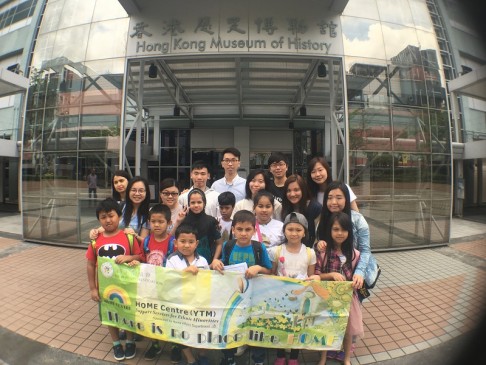
Breaking the language barrier
One ongoing challenge, of course, is teaching non-Chinese speaking children how to pronounce Cantonese. For Dr David Yuen, a lecturer at the Department of Chinese and Bilingual Studies, who runs the “Teaching Chinese as a Second Language in Local Schools” project, the best approach is to believe nothing is impossible for a willing mind.
“Non-Chinese learners always have difficulties in picking up the nine tones of Cantonese,” Dr Yuen says. “But with music being a common language, we show the children how to pronounce 3, 9, 4, 0, 5, 2, 7, 8 and 6 in Cantonese, which actually represent the nine tones. Then for every new character we teach, we refer to one of these numbers. We also use pictures and gestures to help them remember the tones.”
Jessica Lam, who was part of this project last year, gained more than she expected. “Initially, I just wanted to apply what I had learned in my language course at PolyU, but the service-learning experience helped me know more about myself, things I simply couldn’t learn from a book.”
She says the experience made her more considerate and attentive to details. It also enhanced her leadership and classroom management skills, and made her understand that teaching is never an easy task.
“I feel sorry for being so picky about my lecturers in the past,” Lam says.
Dr Yuen believes such experience is invaluable and will stay with the students for life.
“Some graduates have chosen to work for NGOs and some came back to help us prepare course materials or share their experiences. Each year, we are also excited to see our students bringing a new energy to help the underprivileged ethnic minority children in the community.”
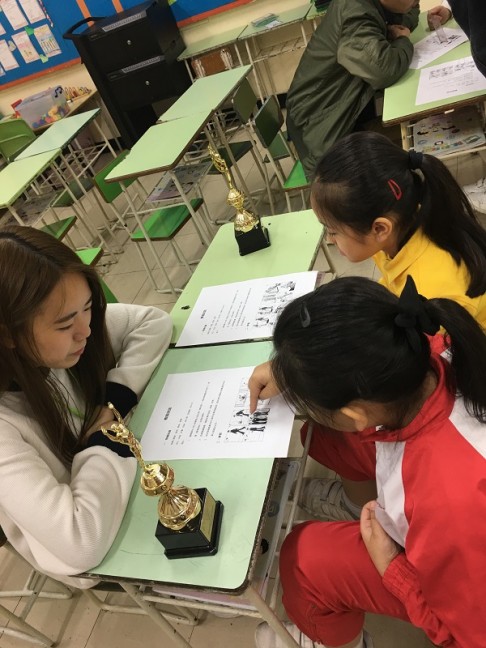
Lifelong insight and inspiration
For children with learning difficulties, educating their parents about the best steps to take is very important.
Therefore, the “Teaching Parents Language Facilitating Skills though Story-telling Activities” project focuses on that area, providing practical advice and assistance.
“We aim to help children overcome language learning obstacles,” says Fiona Tong, a master’s student of speech therapy from the Department of Chinese and Bilingual Studies. Last year, she conducted many one-on-one training sessions for parents and students in need. “We use games, storybooks and many other creative methods.”
For instance, Tong introduced the PEER (prompting, evaluating, expanding and repeating) method. She also recommended the OWL (observing, waiting and listening) approach to parent-child communication. The project taught her that finding the right way to help children is the key to fully developing their potential. Good three-way co-operation between teacher, parents and child is also essential. But, for Tong, the best thing about the project was the inspiration from dealing with disadvantaged children.
“Knowing that they treasure every lesson and have a strong desire to improve meant I could never give up and get disheartened,” she says.
Involving students in service-learning makes them aware of what is going on in the community and the possibilities for tying course content to needs in the real world. Such understanding can continue to bring unprecedented positive change to the society.
